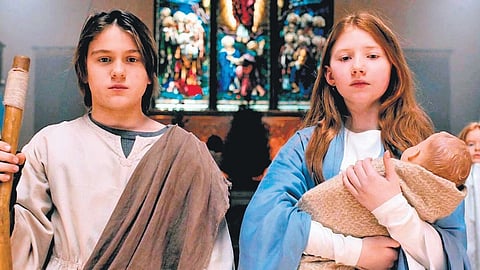

Imogene Herdman (Beatrice Schneider) shouts, “They’ve had all kinds of chances,” when the church begins adding names of participants for the 75th Christmas pageant in their town. This line encapsulates the core message of inclusivity in The Best Christmas Pageant Ever, a film full of life that beams with positivity. Directed by Dallas Jenkins, the film begins with Beth (Molly Belle Wright/Lauren Graham) narrating the story of the troublesome Herdman siblings in their fictional neighbourhood of Emmanuel.
The Herdmans, estranged by their father and largely ignored by their mother, are ostracised by the community. Their presence is frowned upon, and they too really don’t care about socialising with others in Emmanuel. Yet, as fate would have it, these children, who have never even stepped foot in a church, are cast in the leading roles of the Christmas pageant. Thus, Beth gains a profound understanding of the true meaning of Christmas.
The film, based on Barbara Robinson’s novel The Best Christmas Pageant Ever, is light and resplendent in hope. One of its best aspects is that it also doesn’t shy away from criticising the arrogance of people hailing from so-called ‘decent families.’ Dallas Jenkins, who made the Christian web series The Chosen, proves perfect for the subject as he has poured his heart and soul into this narration. No character feels forced or contrived here, and they all feel real and relatable as well. Beth, Grace, and Imogene anchor the story, representing three kinds of people: the flawed, the judgemental, and the ever-loving. The film comforts all three kinds and corrects the judgemental ones gently.
Besides its impact on an individual level, the film challenges certain norms and traditions that tend to gatekeep faith from the so-called “bad people”. During the rehearsal scenes, the Herdmans curtly ask the most pertinent of questions upon hearing the story of Jesus’ birth for the first time, but they are deemed rebels for it. Beneath the aggressive antics of Imogene and her siblings, we sense their helplessness of not getting to have anything kids of their age carry. From a good lunch to an attractive locket, the Herdmans cannot ask their parents (they aren’t around for them) but will just have to snatch. While the inhabitants of Emmanuel view this as criminal activity, it is just hungry kids crying and getting aggressive over not having anyone to attend to their needs.
The poor Herdsman siblings attend the church and the Sunday class for the first time just for some tasty food. This highlights the irony that the one institution that could offer these neglected children principles to lead a decent life is off-limits to them. The film effectively depicts how the fear of certain parents and their prejudice against children from backgrounds such as that of the Herdmans, fuelled by gossiping and harmful stereotypes, perpetuates a cycle of exclusion.
While the film gently yet firmly condemns the judgemental types and comforts the flawed, it also offers a message of hope and second chances. Imogene and her younger ones develop a profound connection between the Divine Being’s presence in a humble manger and their own pitiful existence. Their transformation is deeply moving, filling us with hopes for their escape from the abyss of the life they are living.
Grace (Judy Greer) and her husband Bob (Pete Holmes) are the only characters that stick to their goodness and firmly believe that staying good will not cause them any harm. Their belief that “Jesus was born for the Herdmans as much as he was born for all of us” underscores the film’s inclusive message. Grace, the pageant’s director, letting the Herdmans use the props they want is another message that religion has to become flexible to be of maximum utility.
The Best Christmas Pageant Ever is either perfect or brims with optimism, making every flaw unnoticeable. Regardless, it makes us root for a film that buttresses the point that the flawed and frail are more deserving of faith and religion than the pious and self-righteous.
Director: Dallas Jenkins
Cast: Judy Greer, Pete Holmes, Beatrice Schneider, Molly Belle Wright, Lauren Graham
Rating : 4/5